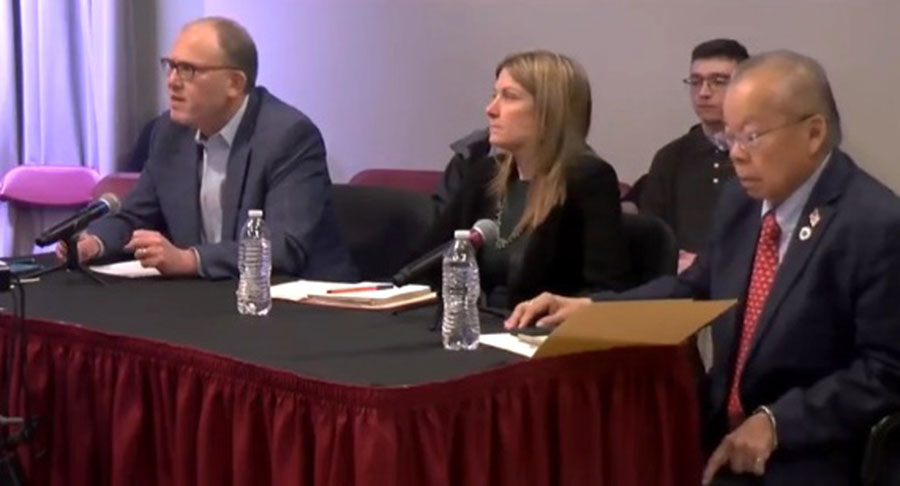
By MARK SARDELLA
WAKEFIELD — The three state legislators representing Wakefield paid a visit to the Town Council this week after the board asked to speak with them about increasing the amount of state funding coming to Wakefield.
With State Representatives Donald Wong and Kate Lipper-Garabedian alongside, State Senator Jason Lewis did most of the talking for the delegation.
Lewis said that thanks to the Student Opportunity Act, Wakefield has gotten significantly more Chapter 70 state aid for education in the last couple of years. He also said that the delegation has prioritized other earmarks for Wakefield, citing state funding assistance for refurbishing the Bandstand as well as funds for Beebe Library, public safety, WCAT and the Boys & Girls Club.
He also noted that the delegation has strongly supported the new Wakefield Memorial High School and Northeast Metro Tech building projects.
He said that the delegation would do all it could to prioritize money for education and unrestricted local aid.
Wong added that Wakefield’s Chapter 90 funding is expected to increase significantly in the next state budget. He said that the more money that the state provides, the more the town can direct its own funds to local needs.
Town Councilor John Carney brought up Chapters 40A and 40B, citing all of the new housing developments that have appeared in Wakefield recently. He said that laws like Chapter 40A (the MBTA multifamily zoning mandate) hurt Wakefield by putting restrictions on funding.
Town Administrator Stephen P. Maio pointed out that Wakefield’s local aid has not kept pace with inflation over the last decade. He said that Wakefield’s per-pupil Chapter 70 funding should be comparable to what communities like Reading and Stoneham receive, yet Wakefield gets the least of all the contiguous communities.
But Lewis maintained that the point of the Chapter 70 formula is not to provide the same per-pupil amounts. He also noted that both Stoneham and Melrose are having their own fiscal troubles and are contemplating Proposition 2 1/2 overrides.
Councilor Edward Dombroski said that if Melrose and Stoneham are in trouble, it means that the state legislature has failed them. He said that, even with the Student Opportunity Act and the Millionaires’ Tax, “look at where your communities are.”
Dombroski maintained that Wakefield is very similar to Reading and Stoneham and the per-pupil cost is a significant issue.
“We in Wakefield can spend a dollar better than you can on Beacon Hill,” Dombroski said. “Give us the dollars. We know how to direct them better.”
Things got a little testy when Dombroski cited the Millionaires’ Tax as another way that the state seeks to grab even more from the taxpayers. Lewis took exception the comment.
“I think we had that debate,” he said, “and I think you know you lost because the voters of Massachusetts voted for that.”
Councilor Douglas Butler was also critical of the Chapter 70 formula, maintaining that even when compared to demographically similar communities, Wakefield comes up short.
He also suggested that Wakefield comes up short in terms of representation at the State House, with Lipper-Garabedian and Wong representing the entirety of their home communities of Melrose and Saugus, while splitting Wakefield.
Lewis defended his colleagues’ commitment to representing Wakefield.
Councilor Robert Vincent raised some concerns related to funding sources for Wakefield’s new Affordable Housing Trust.
Councilor Mehreen Butt asked the delegation to look for ways to protect people from “some of the things coming out of the federal government.” She said she didn’t want to see things like Wakefield’s bans on plastic bags and plastic straws undone.
—
